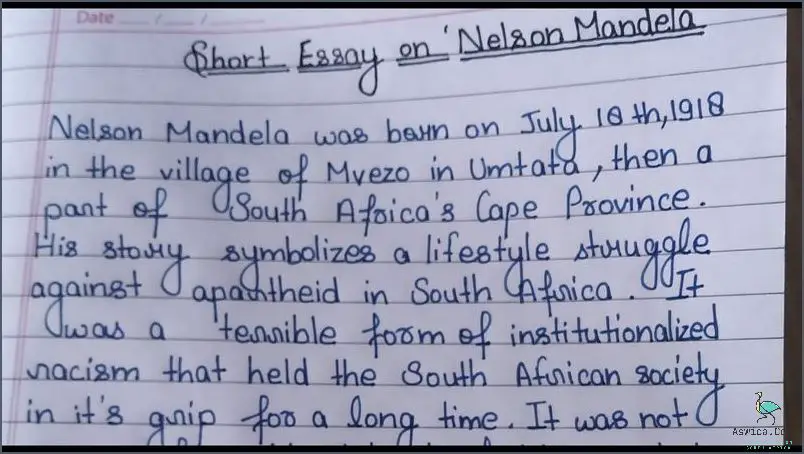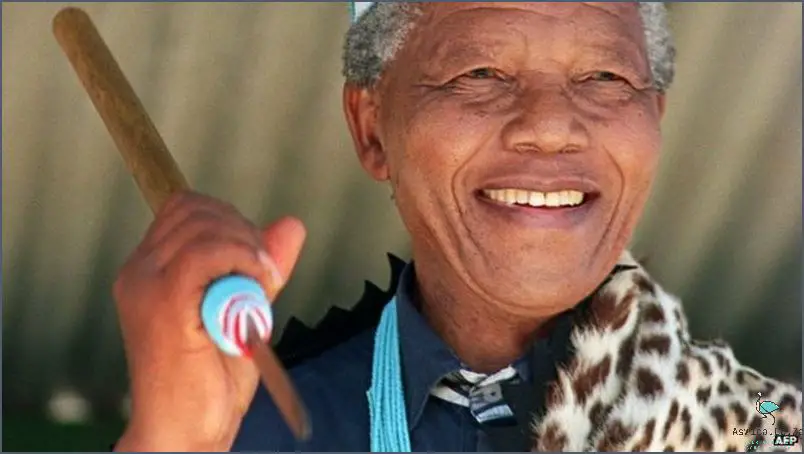
Nelson Mandela Early Life Essay is an essay about the life of the former South African president, Nelson Mandela. It covers his early life, his involvement in the anti-apartheid struggle and his impact on the country after his release from prison. The essay includes the details of his childhood and his early years in the African National Congress (ANC). It also covers his imprisonment, and his legacy upon his death in 2013. This essay seeks to provide an in-depth understanding of the life of Nelson Mandela and his significant contributions to South African history. It also highlights Nelson Mandela’s courage and determination to fight for equality, freedom and justice for all South Africans.
Contents
Nelson Mandela Early Life Essay
Nelson Mandela is one of the most famous leaders of the 20th century. He was born in 1918 in a small village in South Africa. As a child, Mandela attended a local school, where he studied English and Xhosa. His education was interrupted by the death of his father, but he eventually went on to complete his studies at the University College of Fort Hare. After completing his studies, Mandela became a lawyer and political activist. He joined the African National Congress, a group that opposed the oppressive apartheid system in South Africa, and led the group in numerous acts of civil disobedience. Mandela was eventually arrested and sentenced to life in prison, where he served until his release in 1990. He went on to become the first democratically-elected President of South Africa in 1994, and is remembered as a symbol of peace and justice.
Parentage and Early Life
Nelson Mandela is undoubtedly one of the most iconic figures of the 20th century, and his early life and parentage were integral to his later success. He was born on July 18th, 1918 in Mvezo, South Africa, to a Thembu royal family. His father, Gadla Henry Mphakanyiswa, was a local chief and his mother, Nonqaphi Nosekeni, was a member of the Xhosa tribe.
Mandela was the first of his family to attend school, and he developed a passion for education at an early age. He was educated at the local mission school and later the University of Fort Hare before completing his bachelor’s degree at the University of Witwatersrand. His studies focused on law, and he was a tireless advocate for equal rights throughout his life.
Not only did Mandela’s education shape his later advocacy, but his early life also influenced his later political career. His father was a strong advocate for peaceful resistance and was highly influential in Mandela’s own views on peaceful protest. Growing up, Mandela was exposed to different cultures and people, which helped shape his understanding of the world and his commitment to justice and equality.
Mandela’s parentage was also important to his later success. His father was a leader of the Thembu people, which meant Mandela was able to learn directly from him about the struggles of South Africa’s indigenous populations. This knowledge of the local history and culture was invaluable to Mandela in his later struggle against apartheid.

Though his parentage and early life were integral to his later success, perhaps the most important factor in Mandela’s incredible legacy was his unwavering commitment to justice and equality. He was a passionate advocate for the people of South Africa, and his leadership and dedication to the cause of freedom are an inspiration to this day.
Education and Early Career
Nelson Mandela, one of the most iconic figures of the 20th century, began his life in humble circumstances. He was born in the small village of Mvezo, South Africa, on July 18, 1918. From a young age, Mandela was exposed to the harsh realities of racial segregation and inequality in his homeland. Despite this, he was determined to receive a quality education.
In 1941, Mandela began to attend the University College of Fort Hare, one of the only higher educational institutions available to black people at the time. During his time at the college, Mandela was exposed to a wide range of skills and knowledge, from economics and anthropology to political science and history. He also became involved in student politics, becoming the secretary of the Student Representative Council and the president of the African National Congress Youth League.
It was during this time that Mandela began to develop his own political beliefs, which were largely shaped by his experiences with racial injustice in South Africa. He was determined to fight for the rights of his people and create a better, more just society. After completing his studies, Mandela became a lawyer and soon began to work in the field of civil rights.
Throughout his career, Mandela worked tirelessly to fight for the rights of black South Africans. He was a major figure in the anti-apartheid movement and a leader of the African National Congress. He was imprisoned for his activism in 1962 and remained in prison for 27 years.
Despite his time in prison, Mandela remained a powerful and influential figure. Upon his release in 1990, Mandela continued to work for the rights of black South Africans and was eventually elected President of South Africa in 1994.

Nelson Mandela’s early life and career were marked by a commitment to justice and equality. His passion and dedication helped to bring about lasting change in South Africa and the world. He is remembered as a symbol of hope and courage, and a reminder of the power of education and activism.
Involvement in the African National Congress
Nelson Mandela is an iconic figure in the history of South Africa, and his involvement in the African National Congress (ANC) was instrumental in the fight against apartheid. Mandela joined the ANC in 1944, and quickly rose to prominence within the organization. He was appointed Deputy National President in 1952 and, over the next two decades, he became a leader of the ANC’s anti-apartheid struggle. Mandela’s involvement in the ANC included organizing mass demonstrations, leading the Defiance Campaign, and speaking out against the oppressive regime.
As the leader of the ANC, Mandela was often in the spotlight, and his role in the organization was of great significance. He was a key figure in the negotiations that led to the 1994 democratic elections in South Africa. Mandela was also a prominent figure in the international community, and his work to end apartheid was recognized by the United Nations and other countries.
Throughout his involvement in the ANC, Mandela devoted much of his time to the struggle for human rights. In 1962, he was arrested and charged with treason, and he was sentenced to life imprisonment in 1964. He spent 27 years in prison, and his time there was marked by hardships. He was released in 1990, and upon his release, Mandela continued to be an active leader in the ANC.
In 1994, Mandela was elected President of South Africa, and his election marked a new era for the country. During his term as President, Mandela worked to end discrimination and to promote social and economic justice. He also worked to bring the country together, and his efforts were vital in helping to establish a new, unified South Africa.
Nelson Mandela’s involvement in the ANC was essential in the fight against apartheid. His dedication to the struggle for freedom and justice, and his commitment to the principles of equality and human rights, will be remembered for generations to come.
Conclusion
Nelson Mandela is an inspirational and legendary figure who dedicated a large part of his life to the fight for freedom and social justice. His early life was filled with challenges and difficulties, but he was able to persevere and use those experiences to become a leader and an icon for social change. His upbringing in a rural village helped him to develop a strong sense of justice and the ability to stand up for what he believed in. He was highly educated and had a strong commitment to justice and equality, which were two of the driving forces that shaped his life and legacy. His legacy will be remembered and celebrated for generations to come.



